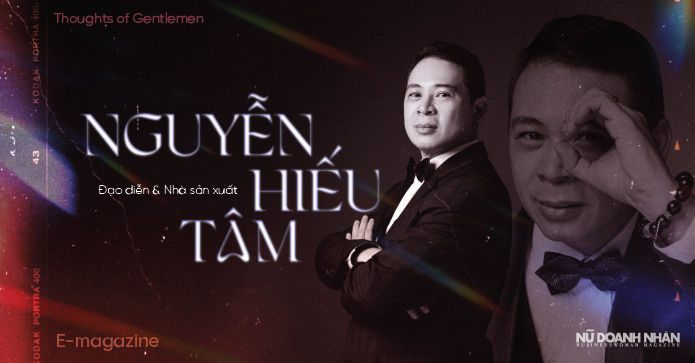“The true sign of intelligence is not knowledge, but imagination.” The famous quote by the renowned scientist Albert Einstein perfectly culminated our conversation with Director – Producer Nguyen Hieu Tam.
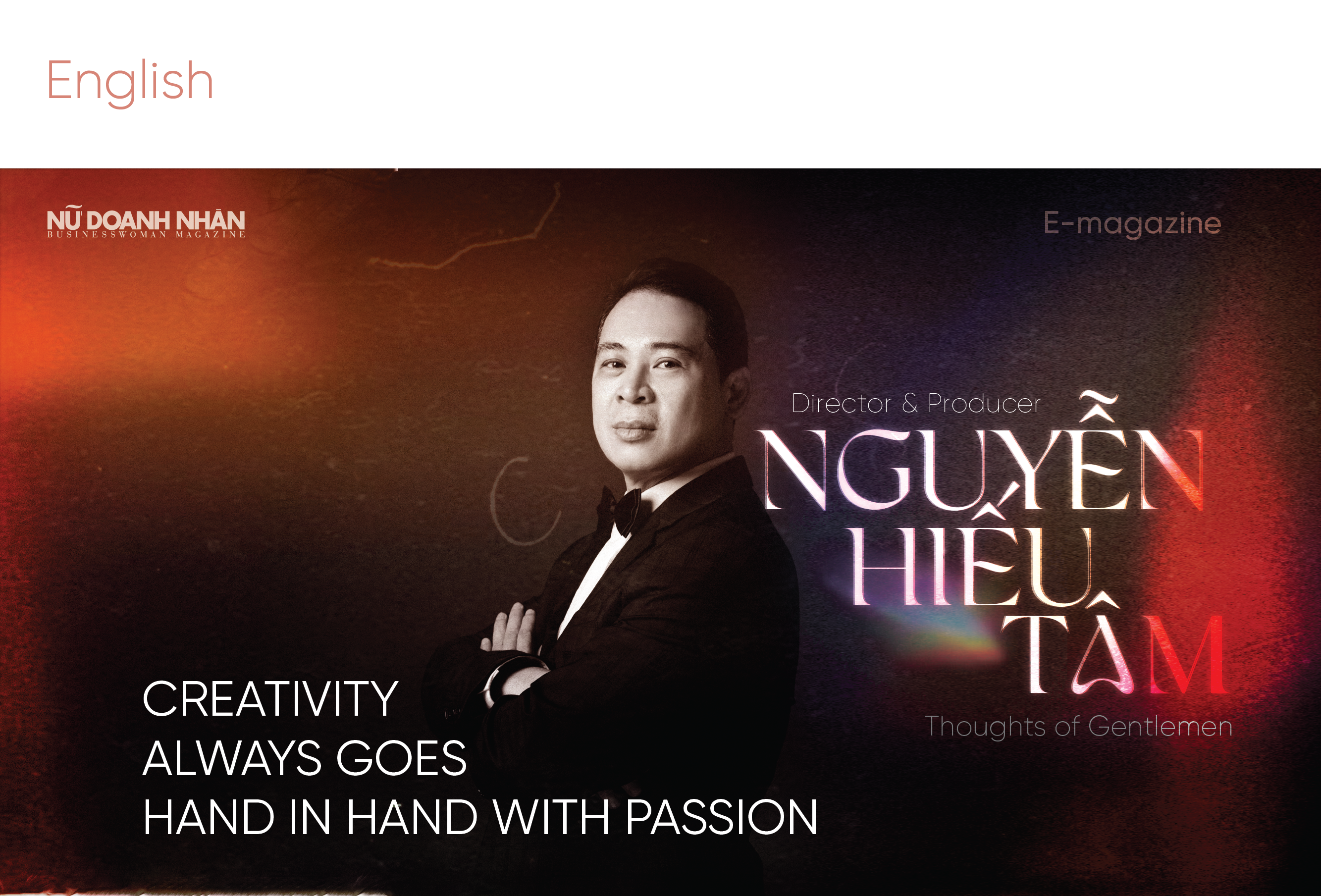
Becoming a director and creating works of art has never been an easy path for those who choose to embrace this career of creativity. But creativity aside, what gives them the conviction to persevere in even the darkest of times is the passion and desire to turn their innovative ideas into a spectacular stage performance. A producer is the most important factor, the heart of and soul of every performance, the last one to leave the final rehearsal, making sure everything is ready for the big day, the one who breathes the biggest sigh of relief as the curtain closes and the rounds of applause begin; in short, the “indispensable” position in the backstage to make sure everything shine in their own time. Such is what we hope to write about our figure for this issue’s Thoughts of Gentlemen column – director and producer Nguyen Hieu Tam, the man behind numerous successful events and performances, both domestic and international. Despite being highly reputable in the Vietnamese fashion world, the only impression Nguyen Hieu Tam left in the conversation with BusinessWoman Magazine was the composure of a gentleman, his ungarnished manner of speech and life philosophy: “Happiness is knowing you have enough”.

Greetings Mr. Nguyen Hieu Tam! Is there a story to how you became a fashion event director despite starting out as a stage director?
In fact, my starting point was not in any field of art at all, but in economics, specifically retail commerce and marketing. During the process of brainstorming for solutions and ideas for commercial events, I discovered my appreciation of arts and eventually became a stage director. The increasing popularity of fashion created a demand for catwalk directors, even those working in other fields, and my experience in stage directing became an advantage. I made a turn on my career path and has been working as a fashion director for over 10 years now. For me, it is a “self-taught” profession. There were, of course, a few fumbles and stumbles at first, since running a fashion show and a vaudeville performance requires two very different approaches, but I adapted quickly, with the support of many senior directors in the field and was given many opportunities to enrich my experience and become a full-fledged director as I am today.
Would you say it’s a case of “profession chooses man” for you, now pursuing a career you didn’t set out for in the first place? And what kind of “gains” and “losses” has this chance profession brought you?
It is, indeed, a case of “profession chooses man” for me, the serendipity of which has brought me both “gains” and “losses” to a great extent. The biggest “gain” for me is to discover what I truly have passion for. What started out as a sparkle of work has become a flame of passion, guiding me through every hardship and challenge. Another “gain” from this job is the emotional uplift that is the love and respect from my colleagues and friends. This makes me extremely proud and happy, for the most important thing in life is to be loved. Another crucial “gain” is the creativity aspect, the opportunity to refresh myself and keep on learning as an insider rather than a mere audience.
On the other hand, the first “loss” I have to mention is the pressure. As a director, I’m responsible or the make or break of a fashion event, and the bigger the scale, the greater the pressure. Directing requires a meticulous attention to every single detail, to make certain that every aspect, every moment of the performance unfolds in the most perfect way possible. That being said, there are always many unexpected complications, and even with my experience and headstrong spirit, I always strain myself when taking on a new project. My health condition, naturally, has suffered from such a pressure. That’s the biggest “loss” in this profession. We often teasingly say it is completely possible to have your hair turn all grey after only one show.
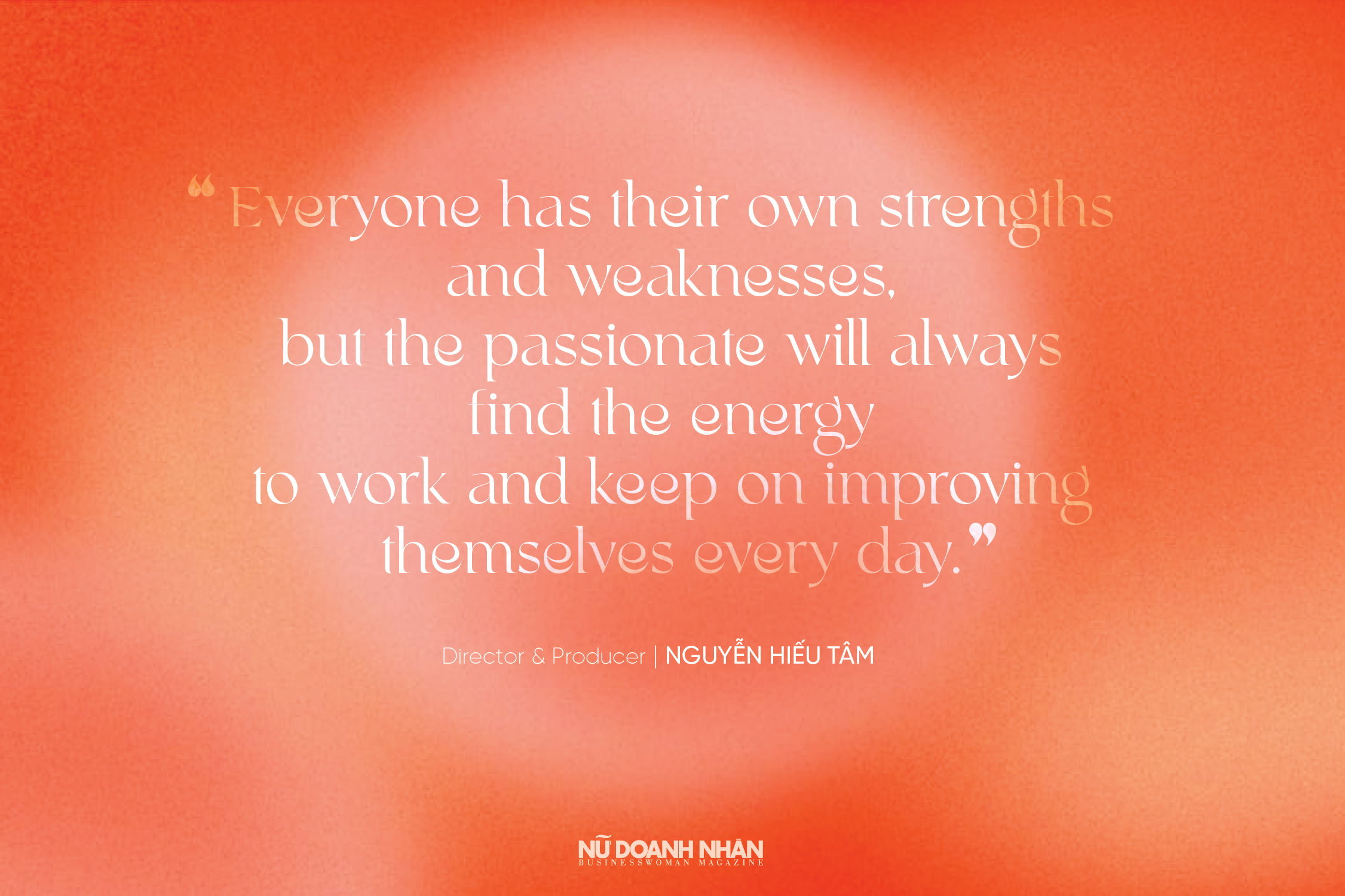
In a profession that Nguyen Hieu Tam “picked up along the way”, how did you learn to become successful in it?
There are similarities between stage and fashion performance, which is an advantage for me considering my experience. However, fashion also has a number of distinctive traits that require the stage to adapt accordingly. That’s why the first thing I did was to dig into the history of fashion and studied as many fashion shows in the world as possible. In the past, most fashion shows in Vietnam were organized in the form of a variety show, that is, fashion on a simple stage. But with time, as everything became more professional, a stage fit for a fashion show has to meet the standards of the international fashion industry, with the biggest focus being honoring the designer’s collection and idea. In order to achieve this, I studied further into the application of technology in performance, especially lighting arrangements. Only two basic colors can be used in a fashion show – white and yellow, a simple yet extremely challenging task for a lighting director. The purpose of light is to accurately reflect on the color and material of a collection, and the responsibility falls on the director’s shoulder to utilize the visual language to highlight the distinctive traits of a collection in the most elegant and appealing way possible. Idea brainstorming for a fashion show, in addition, has also been an aspect that I try to improve on over the years. To be more specific, a director has to dig deep into the art of arrangement to optimize the unique space of a fashion stage. A golden rule of thumb is maintaining harmony among all elements, not overusing effects, backgrounds, stage props or music, with a view to deliver the most authentic experience of every costume. Every seat must have the exact same viewpoint at the catwalk and invoke the exact feelings that a designer wishes to convey through their work.
Now as a bruised veteran in this field, how different are your challenges now from those in your early days?
At this moment, the biggest challenge for me is how to retain my passion and enthusiasm for the job. The longer you pursue a career, the more likely you are to enter a period of emotional callousness, which I’d be terrified to be in. Moreover, the pandemic situation has brought great changes to the format of stage performance, going online and utilizing digital applications that provide a refreshing experience. These changes, considering the fact that fashion shows have always been about a direct, hands-on experience, pose a challenge to a director. One has to really rack their brain to find a way to preserve the visual satisfaction for the audience, who can only enjoy the collection through a screen. Another challenge for me is the rise of the young generation (Grinning). Young people nowadays have a strong knowledge foundation and a wide range of opportunities to experience and learn, not to mention their familiarity with digital technology, which requires me to constantly innovate myself if I don’t want to become obsolete. Unlike my early days, when my only difficulty was the lack of knowledge and experience that held me back, I became rather conservative and “held back” in my decisions later on as I started gaining popularity. This is unacceptable for someone working in the field of creativity, which requires people to embrace challenges and take risks, not stay in their safe cocoon and keep treading the treaded path. Fortunately, I soon became aware of these misguided thinking and made timely adjustments. The ultimate key to a lasting career in creativity is to allow yourself to try, accept the difference and even expect that you might be wrong. Breakthroughs only come when we dare to try and experience something new.
How do Nguyen Hieu Tam think a creative worker in the modern event organization industry should develop their mindset?
This is an extremely demanding job, and without enough passion, you’ll not last the grind. For those who have chosen this career, ask yourself if you have what it takes to stay determined and passionate – the sensitivity to everything artistic and aesthetic. Without such a quality, a creative worker will struggle with the concepts that they find difficult to appreciate. Another must-have quality is the aspiration to learn and refresh yourself constantly. In addition, try to be open to negative opinions and feedback, and don’ forget to put yourself in the shoes of the audience to realize what you might have missed as an organizer.
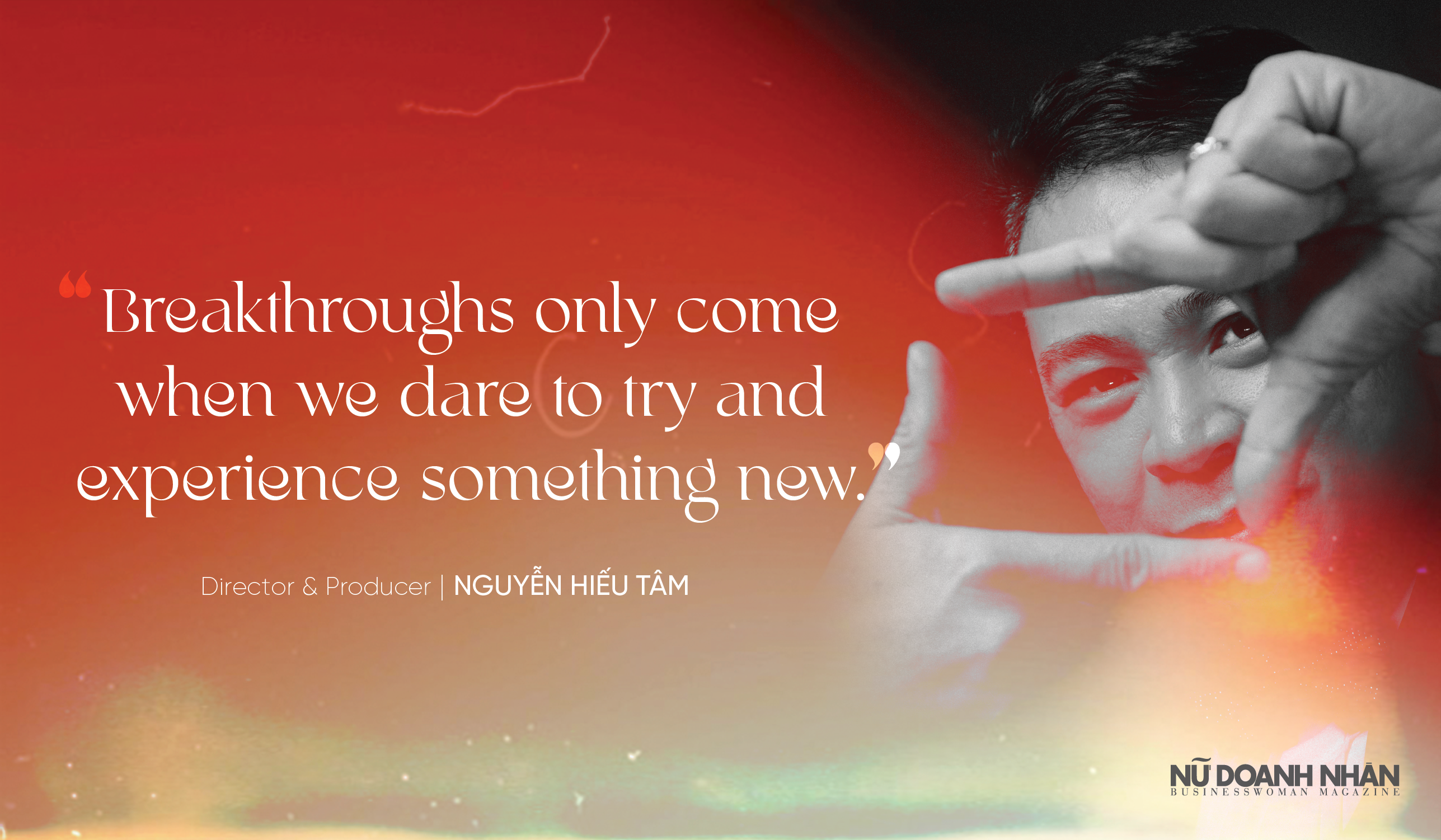

How do your colleagues see you as their “commander-in-chief”? What is your management principle?
I can be quite demanding (Grinning). As a director, I have to pay constant attention to the show’s general overview while also making sure every detail goes as planned, for they are all intimately linked to each other to bring about the cohesion of the whole event, and all it takes is one broken link to ruin the entire chain of operation. Most of the people in my team have been working in this field and with me for over 10 years; they share my opinion and know my personality, which makes us suitable companions for long journeys. My principle, you may say, is to always be “demanding”, not going easy on myself and my associates. Work harder, harder, and harder, until perfection is reached, that’s how we make our preparations, minimizing the risk of complications but improvising quickly should one arise.
How do Nguyen Hieu Tam make your crew understand the importance of being serious in what you do?
The first thing I always do when taking on a project is to make an organizational chart and assign a specific task to every staff and every department. This will help them understand their role and responsibility, and how to cooperate with each other. One thing I often tell my crew is that those of you who choose to pursue this career are extraordinary and abnormal, for your job is unlike any other job. When everyone else is on a holiday, you may still be on the job, and when everyone is working, you… are also working (Grinning). Therefore, once you have chosen to commit to this profession, you must be prepared for its challenges and hardships, and address it with seriousness and responsibility if you want to have lasting career.
Have you been able to train the succeeding generation? What are your standards for someone who could develop their career along your side?
During the course of my work, I’ve taken a number of young people into training once I had enough confidence in their capability. Among them, some have made a name for themselves in this field. As for what it takes to ride along with me, the first thing is that they must be like me, meticulous and intolerant of any slacks. Then, again, comes the passion and aspiration for knowledge. Everyone has their own strengths and weaknesses, but the passionate will always find the energy to work and keep on improving themselves every day.
What do you often tell your crew before officially launching a project?
I often end with: “The fight is on brothers!”. I want my teammate to embark on any project with a warrior spirit, for nothing worthwhile is ever easy to achieve.

At the moment, are you “living to work”, or “working to live”? What are your next goals in life?
I am “living to work”. My life and work are intertwined, and I can feel the stability in their relationship, so there’s no need for any grandiose goals. I’ve always had a dream of teaching the young generation, passing on my knowledge and experience to them, and if I have a chance, I want to test my limits as a movie director and make a film of my own.
An event director is always surrounded by light and sound, but is your personal life also as dynamic?
It may be hard to believe, but apart from work, my personal life is the direct opposite of those vivacious events. A literally quiet life.
What is your current life philosophy? Do we leave everything to fate or actively seek it?
I’d like to think that I have achieved everything I want in my personal lie. My philosophy, therefore, is: “Know it’s enough, then it’s enough”, I’m not chasing anything too fancy. “Fate” has appeared from time to time in the story of my life, but I still believe you should actively seek what you want. Everyone should know what they want to pursue and seize the opportunity as it comes. That way, everything will come to you faster and easier.
Your work has provided you many opportunities to work and make friends with a lot of talented businesswomen. What is your opinion on the current businesswomen generation?
They are more competent, active, and independent than their predecessors. They work hard, play hard, and are more open-minded than before.
Thank you for sharing!
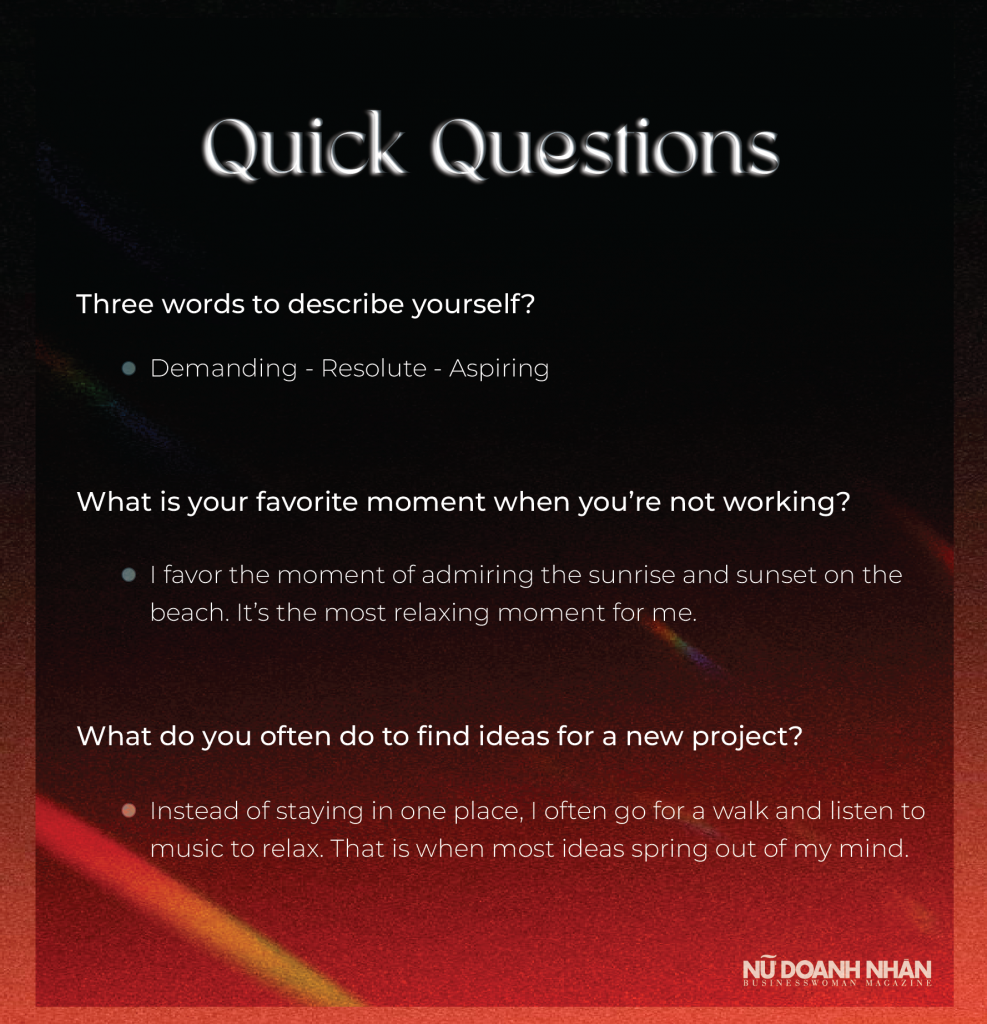


Read more:
